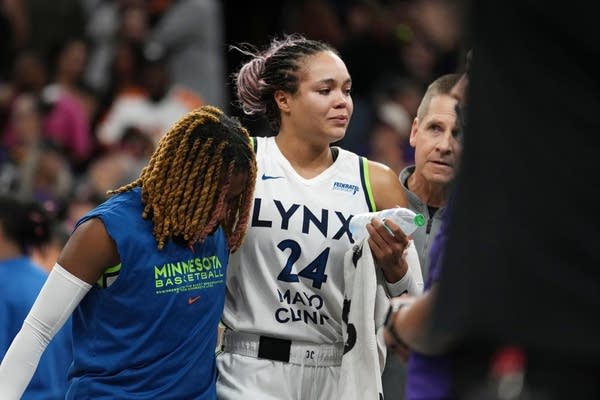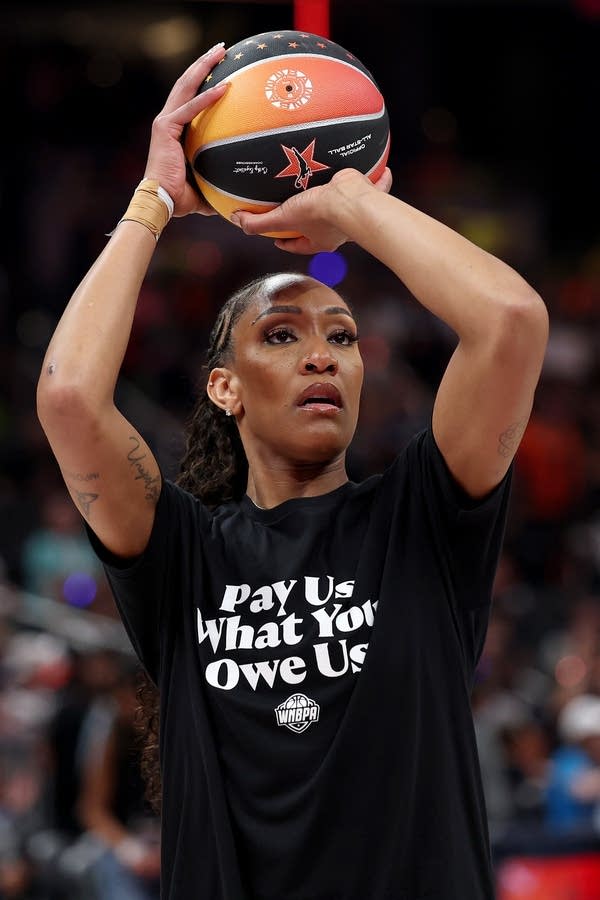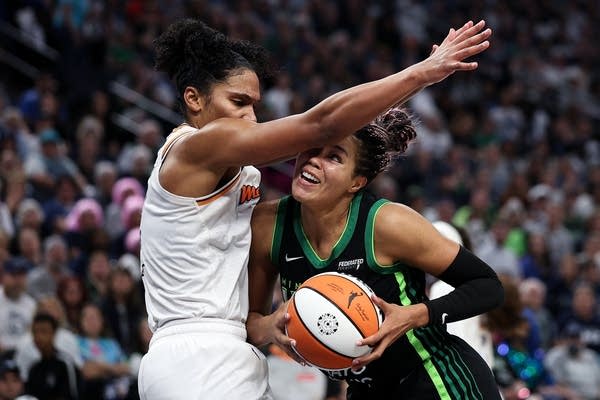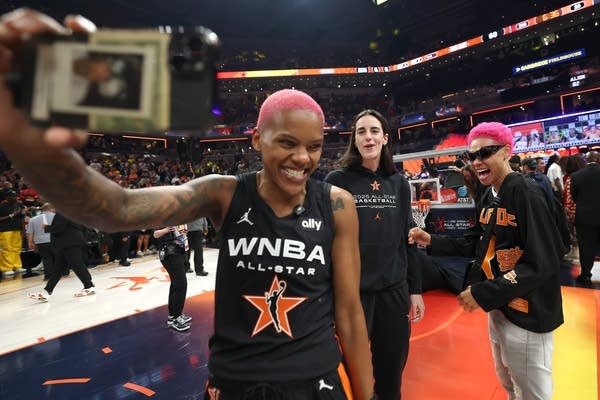ARTICLE AD BOX
Anna Goorevich was with colleagues when she started seeing talk of Minnesota Lynx Forward Napheesa Collier publicly criticizing WNBA leadership. They immediately tuned in.
“We were like, ‘Wait, something's going on. Phee is talking.’ And when Phee speaks, we all listen, of course,” Goorevich said.
Goorevich is a PhD Candidate at the University of Minnesota’s School of Kinesiology. She is in her last year of the program pursuing a concentration in sport sociology. Her specific interests include gender and sport, but particularly gender and coaching and menstrual health and sports.
When conversations began at the WNBA following the Lynx’s elimination from a possible championship run, Goorevich was all ears. But she wasn’t alone. Fans across the league have watched the press conferences from Collier, Lynx Head Coach Cheryl Reeve, Las Vegas Aces player A’ja Wilson and others, and there has been an outpouring of support on social media.
While the saturation of this conversation in the sports world may be recent, these concerns echo long-held qualms players and coaches have voiced.
What happened: How the WNBA and the Lynx got here this season
Things erupted after the third game of the Lynx’s semifinals match against the Phoenix Mercury. With less than 30 seconds left in the game, Collier went down with what turned out to be torn ligaments after colliding with Phoenix’s Alyssa Thomas.
Coach Cheryl Reeve interrupted playing to question referees, which led to her getting ejected from the game. Following the loss, she spoke to reporters.
“The officiating crew that we had tonight — for the leadership to deem those three people semifinals playoff worthy is f——— malpractice,” Reeve said.

Reeve received what is believed to be the biggest fine for an individual coach or player in league history at $15,000 for her comments and conduct. She was also suspended from the fourth and — what turned out to be — final game of the series.
Days later, Collier spoke to reporters with a prepared statement disclosing private conversations she said she had with Cathy Engelbert that portrayed the WNBA commissioner as a leader who lacks accountability.
Collier’s statement ranged from speaking about the value players like Caitlin Clark bring to the league to discussing inconsistent officiating. It’s something Collier feels Engelbert and the WNBA haven’t addressed.
“We have the best league in the world. We have the best fans in the world. But we have the worst leadership in the world,” Collier said. “Year after year, the only thing that remains consistent is the lack of accountability from our leaders.”
Engelbert replied saying there’s work to be done to repair relationships with players in the league. She also said there were “inaccuracies” in some of the comments attributed to her by Collier.
“I was disheartened to hear that some players feel the league and that I personally do not care about them or listen to them,” she said. “If the players in the W don’t feel appreciated and value from the league, we have to do better, and I have to do better.”
Just this past weekend, Collier cancelled a meeting scheduled with WNBA Commissioner Engelbert.
While this has dominated the WNBA side of social media for only a few weeks, these conversations didn’t just start, Goorevich said. Players and coaches alike have been calling for changes at the W for some time including safety and privacy improvements, fair pay and better officiating.
“Advocacy and fighting for equality and having outspoken discussions about player treatment and player rights has been ingrained in the fabric of women's sports since the beginning of time, and especially since Title IX and pioneers like Billie Jean King,” Goorevich said.
Recently, things are bubbling over in a new and more publicized way, Goorevich said. Viewership has grown, and with more hype surrounding college women’s basketball in the WNBA’s off-season, fans' investment in the sport hasn’t lost momentum. And with the inaugural season of the 3x3 league “Unrivaled,” started by Collier and New York Liberty’s Breanna Stewart, there has been even more opportunity for fans to embrace these athletes.
"I think just there might be a lot more visibility and attention being paid towards it, especially towards athletes like Phee and A’ja Wilson, who maybe wouldn't have gotten that type of attention beforehand by the mass media and by viewers online," Goorevich said.
‘Pay Us What You Owe Us’: Players fight for compensation
This season, mounting tension has surrounded the Collective Bargaining Agreement for the players union. It is set to expire Oct. 31, and little agreement has been reached. One of the players' biggest concerns is adequate compensation.
For the 2025 season, the average wage was $120,000, while top players make close to $250,000 a year. This is vastly different from the NBA, which pays its top players around 200 times as much.
The NBA does bring in more revenue than the WNBA, but how money is divided is much different. In the NBA, players get paid roughly 50 percent of “basketball-related income,” which includes most of the league's revenue, according to the New York Times. However, the WNBA's current collective bargaining agreement does not guarantee that a percentage of league revenue will go to the players.
That means as the WNBA makes more money — as they have been doing with growing popularity — the players do not have to be compensated proportionately. The New York Times reports that the percentage of revenues paid to players fell from to less than 7 percent this season.

Conversations of getting their “slice of the pie” ring a bell for Jacqui Kalin. She is now a color analyst in the Missouri Valley Conference but played internationally at the professional level from 2013-2015. She also coached and played at the college level. She had teammates who played in the WNBA.
“Back when I played, you only played in the WNBA for the prestige of playing in the league. You went overseas to make money,” she said.
For Collier, it’s been a major factor of her season as a vice president of the players union.
In her statement, Collier said Engelbert told her that players like Caitlin Clark should be thankful for the way the WNBA has offered them a platform for receiving brand and media deals, in response to Collier’s questions of why revenue-driving players like Clark, Angel Reese and Paige Bueckers are making so little their first four seasons.
“That's the mentality driving our league from the top. We go to battle every day to protect a shield that doesn't value us. The league believes it succeeds despite its players, not because of them,” Collier said.
Calls for improved officiating
It hasn’t just been calls for better pay. One of the other calls is for a change in leadership when it comes to officiating.
Kalin said that for both Reeve and Collier, who are seen as some of the most pivotal changemakers of the league, it is especially notable that they were pushed to this publicized criticism.
“Cheryl's just literally one of the best of the best of the best. And I think somebody of that caliber and reputation, I mean, it just speaks volumes to what happened. And I think that can't be overlooked,” Kalin said. “Same with Napheesa Collier. I mean, not that somebody — a different coach and different player — wouldn't deserve the same attention, but I just think that's what speaks so highly to how big of a deal this is.”
One of the most important lessons she learned in her career about officiating was that the referees want to get the calls right, more than anyone else, Kalin said. But she recognizes that the WNBA has reached the spot where things have to change.
“I'm at the point where I'm like, ‘Holy smokes, you guys, this is a problem,’ and it's not that a specific referee is to blame. But I will say, this did not happen overnight. This has happened over time, and it's been a long time coming,” she said.
The biggest challenge refs are facing in Kalin’s eyes is that they need to set the tone earlier in the game. In the most physical matchups this season, she believes things got out of hand, which led to dangerous conditions after physicality escalated past what refs could gain control of.

Reeve and others in the league have called for better training for and consistency in refereeing.
The conversation is top of mind for more than just the Lynx. Other coaches supported Reeve’s criticism, like Indiana Fever Coach Stephanie White and Las Vegas Aces Coach Becky Hammon, who were both fined $1,000 for their comments on WNBA officiating where they defended Reeve.
"From what I heard, she did not tell a lie. She said the truth," Hammon said.
The National Basketball Referees Association did not respond when asked for comment.
Players’ identities and impact
WNBA players Angel Reese and A’ja Wilson were quick to voice support for Collier.
Goorevich said player’s identities have influenced their advocacy in the league.
“It's a very diverse league, but what that's meant in terms of the introduction of those identities and the replication of homophobia, heterosexism, racism in the league is that a lot of the labor and a lot of the most outspoken advocates in this league have really been Black women and have been queer women, and so the advocacy and advancement for equity in the WNBA has really fallen on the shoulders and responsibility of Black queer women,” she said.
As of the 2025 season, approximately 64 percent of WNBA players identified as Black or African American, according to Smith & Hattery.
Goorevich notes that while white and straight players have historically been less vocal about these concerns, that has changed.
These challenges are amplified by players’ intersectionality in a sport and society still heavily impacted by queerphobia, racism and sexism, says Goorevich.
For example, earlier this season, there was a string of disruptions throughout games after sex toys were thrown onto the court.
"The sexualization of women is what's used to hold women down. And this is no different. This is just its latest form,” Reeve said.
The future of the WNBA and other women’s sports
For Goorevich, she sees these conversations as part of a long line of women’s athletes advocating for both themselves and generations to come. She hopes it can continue to become a more mainstream topic as women’s sports continue to gain popularity.
“Seeing people talk about it as just like a normal thing, going into bars, and not just A Bar of Their Own — like a dedicated women's sports bar — but seeing the games on at regular old bars,” she said, “it being just a product of not just, you know, this niche women's sports fan base, but that's becoming more something that's of mass appeal. It is so exciting.”

The recent celebration of players’ identities, humor and personalities also excites Goorevich.
“The emergence and popularity of the StudBudz that has been a complete contrast to this hatred and policing and surveillance of Black, queer, masculine women,” she said. “That we have Natisha Hiedeman and Courtney Williams creating this immensely popular Twitch stream, social media stardom, just living their lives, being basketball players, being fun and exciting and becoming huge celebrities across the league and across the country just by being themselves, it’s really cool.”
For Kalin, she hopes healthy conversation, accountability and action can come out of these conversations.
“I think there probably had been conversation the last three or four years — however many years — and no action was taken,” Kalin said. “The goal can't only be healthy conversation, but then actual action and follow-through.”
The third WNBA finals game between the Las Vegas Aces and Phoenix Mercury is Wednesday at 7 p.m.
The 3x3 league, Unrivaled, will see its second season start on Jan. 5, 2026, with two expansion teams and a plethora of returning and new WNBA stars, including three Lynx players: Collier, Williams and Hiedeman.






 English (US) ·
English (US) ·